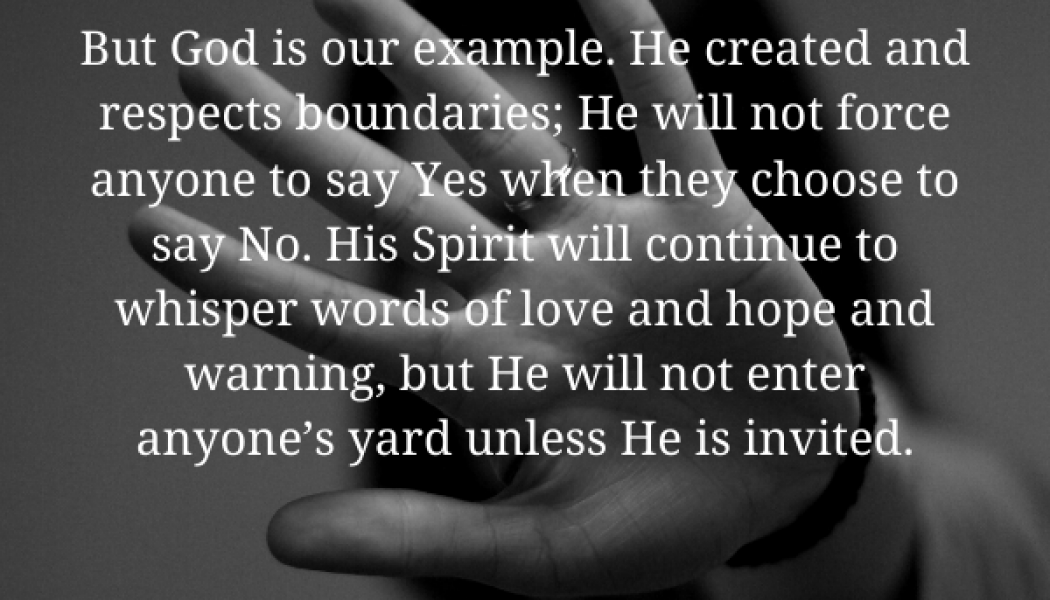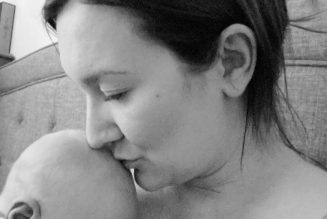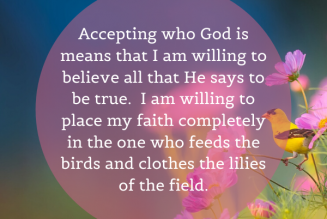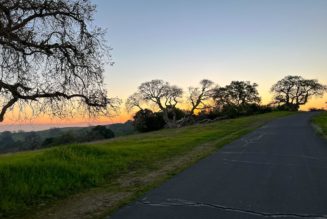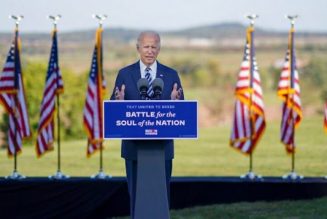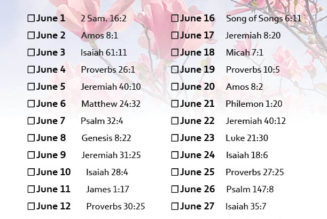I wish someone had told me this sooner in life. Somehow I grew up with the idea Christians, specifically Christian women, should always say Yes when a request is made of them. Obviously, we’re supposed to say No to evil, but I didn’t understand it’s okay with God, and clearly communicated in His Word, that we don’t have to say Yes to every request made of us.
We don’t have to say Yes to every social or church event, every plea for money, every opportunity to serve, or to fulfill others’ dreams and wishes when we have dreams and wishes of our own. I’ve been a student of the Bible since I was a teenager, but didn’t learn the scriptural concept of boundaries until I was in my forties, when I read the Boundaries book by John Townsend and Henry Cloud. They explain how boundaries protect our hearts and help us distinguish between what we’re responsible for and who we’re responsible to.
We protect our hearts by letting good stuff in and keeping bad stuff out. It sounds obvious, but in trying to be good Christians who turn the other cheek, forgive our enemies, and go the extra mile, we fail to understand God has also instructed us to protect our minds, bodies, and spirits from harm. Proverbs 4:23 says, “Above all else, guard your heart, for everything you do flows from it.” Sometimes what harms us is not wrong; it’s just not right for us.
We’re each responsible for what goes on in our own “yard.” We have an invisible fence to protect us from negative influences and abusive treatment. We can choose who enters through a gate in that fence. Anyone who forces their way in to do as they please, or tries to tell us what to do in our yard can be asked to leave. We don’t have to say Yes to their agenda.
On the other hand, we’re not responsible for what goes on in someone else’s yard. When we see them making destructive or sinful choices we can pray and counsel, but we cannot break through their fence and compel them to change. This is heartbreaking when we see they’re headed for ruin—in their relationships, finances, physical health, or spiritual life. But God is our example. He created and respects boundaries; He will not force anyone to say Yes when they choose to say No. His Spirit will continue to whisper words of love and hope and warning, but He will not enter anyone’s yard unless He is invited.

Most people don’t intentionally ignore boundaries. We tend to pressure others to say Yes to our preferences because we’re selfish by nature. We try to influence them to: support our ministry, serve on our committee, vacation or move to the place of our choice, raise their children the way we think they should, go to our alma mater, love us back, or vote for our favorite candidate.
In the past, I gave in to what others wanted and ended up resenting them; I didn’t know I could voice my own needs and desires. I’ve also learned I don’t have to give in when people use the “God card” saying—“I feel like God is calling you/us to do this.” I can decide myself after praying, seeking God’s will, researching the options, and searching my own heart. I can pursue the passions the Lord has ignited in me and use the gifts He has given me, without feeling like I’m letting others down if I’m not who they want me to be.
When we learn to say Yes to all God has for us first, we can say a cheerful Yes or a respectful No without guilt or regret. We can find purpose in God’s plan for our lives. Christ is our prime example. He knew who He was and what He came to do. He didn’t allow human opinion to sway Him from His mission.
When the religious leaders challenged His behavior Jesus said, “To what, then, can I compare the people of this generation? What are they like? They are like children sitting in the marketplace and calling out to each other: ‘We played the pipe for you, and you did not dance; we sang a dirge, and you did not cry.’ For John the Baptist came neither eating bread nor drinking wine, and you say, ‘He has a demon.’ The Son of Man came eating and drinking, and you say, ‘Here is a glutton and a drunkard, a friend of tax collectors and sinners.’ But wisdom is proved right by all her children” (Luke 7:31-35, NIV).
Jesus lived a sacrificial life of love, holiness, and wisdom. He gave freely and abundantly from the Yes He received from God, and He calls us to do the same. We are free in the Yes of Christ!

Beth Vice is a wife, author, speaker, mom, mother-in-law, grandma, and Jesus seeker. She loves taking care of her husband Kelly and the home they share on the Oregon coast. She teaches their Sunday morning small group and leads critique workshops at Oregon Christian Writers conferences, where she serves as the In-Person Critique Group Coordinator. Beth has six books currently available and is working on the next two—a divorce recovery book for women and a Bible study on Revelation. Beth has a heart for women; she has found new delight in leading retreats at she and Kelly’s vacation rental at Black Butte Ranch, and wherever else God might lead her. She blogs at Epiphany: http://www.bethvice.com/. Beth loves getting outside for hikes and gardening, but prefers snuggling inside with a good book or coffee with a friend, in nasty weather.
